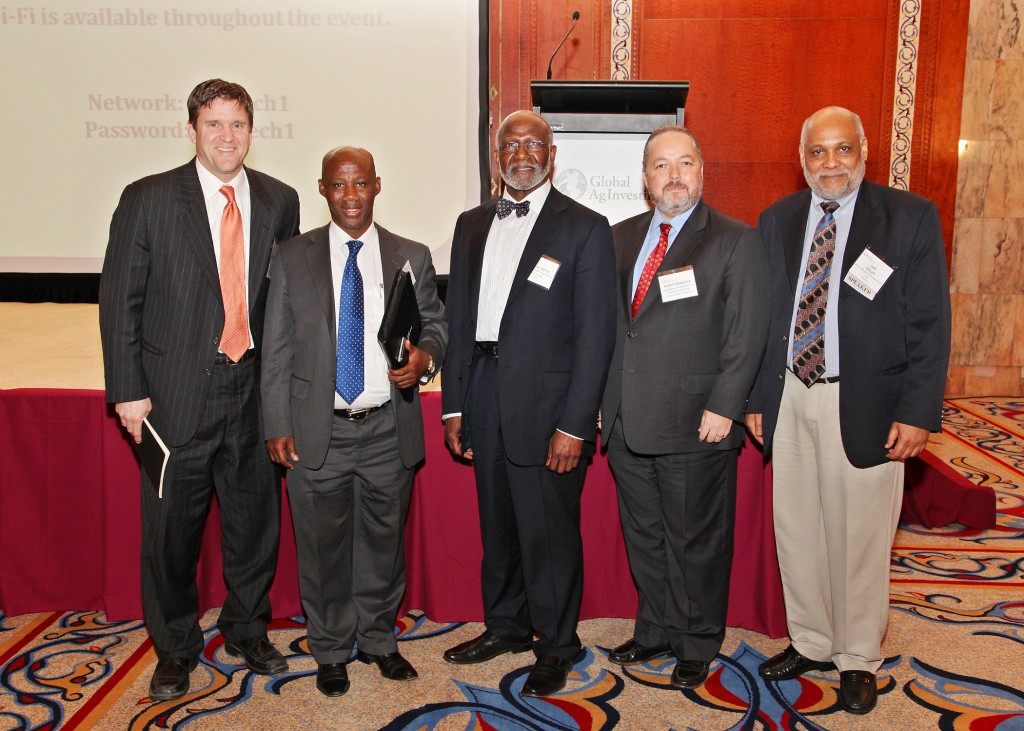ABU DHABI – A new center to facilitate research and training in agribusiness will be created in Ghana with support of leading universities, Africa Atlantic announced today. The center is being established in association with MIT and the Harvard Kennedy School. “We are pleased with the cooperation we have received from the two institutions and look forward to working with their students and faculty,” said Issa Baluch, Africa Atlantic Chairman.
The announcement was made by Mr. Baluch, along with MIT Associate Provost, Professor Wesley Harris, and Africa Atlantic CEO Jon Vandenheuvel, at Global Ag Investing’s Middle East conference. Global Ag Investing is the preeminent series of global conferences of private agricultural investors, with events in the U.S., Europe, Asia, and now the Middle East. The event was attended by asset managers, global investment funds, pension funds, sovereign wealth funds, family offices, policy makers, agricultural producers and processers, technology companies and industry service providers. Also attending was Mr. Tony Kutteng, the deputy to the Consul General of Ghana to the United Arab Emirates, and Mr. Robert Arbuckle, the Counselor for Press and Cultural Affairs for the U.S. Embassy, UAE.
“There is a need for new institutions in Africa to train and support farmers as entrepreneurs; to facilitate the effective participation of private investors, management professionals, agronomists, researchers, students as well as other actors,” added Mr. Baluch, who is also Senior Fellow of the Advanced Leadership Initiative at Harvard University.
The Agribusiness Knowledge Center at Africa Atlantic Farms will be built in the Afram Plains region of Ghana, on Africa Atlantic’s 25,927 acre (10,497 ha) site on the shoreline of Lake Volta, the world’s largest reservoir.
“Africa Atlantic will provide land and facilities, MIT will focus on engineering and management sciences, and the Science Technology and Globalization Project at Harvard Kennedy School will focus on innovative public policy frameworks and strategies. Additional academic institutions and select private businesses and NGOs from Africa, North and South America, Europe, the Middle East, and Asia, are also being invited to collaborate in the Center,” said Mr. Vandenheuvel.
The center will include the establishment of a multi-purpose, multi-stakeholder training facility and campus co-located on Lake Volta with Africa Atlantic’s commercial grain production farm. The Center, with its first facilities to be built in late 2013 with a commitment of seed funding from Africa Atlantic, will consist of executive classrooms, an auditorium, offices, and housing, designed to serve private investors and multinational agricultural businesses, small farmers and outgrowers, students of all ages (youth to post graduate), academic scholars, engineers, social scientists, government officials, and humanitarians.
“This partnership is truly innovative in its focus on agribusiness education and plans to engage students from a diversity of universities. We hope that it will serve as model for on-farm training across Africa,” said Harvard’s Professor Calestous Juma. “The Agribusiness Knowledge Center will help create African farming entrepreneurs and will serve as a catalyst for greater coordination of practitioners, along with leaders from government and civil society, and private investors, to share ideas, transfer knowledge, and build the capacity of Africans to compete effectively and efficiently in the global marketplace.”
Engineering and management sciences will be the focus of the Massachusetts Institute of Technology (MIT). Central to the mandate of the Agribusiness Knowledge Center is the concept of responsible and sustainable private investment. MIT’s students and scholars, skilled in master site planning and economic development regional design, along with systems and process engineering, will apply their skills to enhance agribusiness environmental and social impact standards for the 21st century, seeking greater balance between profitable private investment in Africa and environmental and social sustainability.
“MIT has identified the Agribusiness Knowledge Center at Africa Atlantic Farms in Ghana as a critical laboratory in Africa to advance its mission of applied research and technological innovation in the advancement of humanity,” said Professor Harris of MIT. “Africa Atlantic’s location on Lake Volta and its commitment to offering land and facilities for research and training make it a natural partner for MIT to offer faculty and students a platform for contributing to Africa’s development.”
Africa Atlantic is taking the lead in organizing the Agribusiness Knowledge Center. Plans to host training and executive education programs in late 2013 are already underway, with colleges, universities, and multinational companies expressing interest in using the new facilities to conduct programming. “We are committed to sharing our experiences, facilities, and technology in the hope that we will strengthen the entrepreneurs who will develop the agricultural industry in Africa,” said Mr. Baluch.
Topic-driven programming will be organized at the Center, including conferences and seminars on Women in Agribusiness, Agribusiness Higher Education, Environmental and Social Sustainability, Law and Public Policy, Banking and Finance, Mechanization, Irrigation, Transport and Logistics, and other critical topics. “This training campus is a platform for innovation,” said Mr. Vandenheuvel. “Serious investors, academic institutions, and all who share a passion for the advancement of agribusiness entrepreneurship in Africa are welcomed at the Center.”

At Global Ag Investing’s Middle East conference in Abu Dhabi, from left, Africa Atlantic CEO Jon Vandenheuvel; Tony Kutteng, deputy to the Consul General of Ghana to the UAE; MIT Associate Provost, Professor Wesley Harris; Robert Arbuckle, the Counselor for Press and Cultural Affairs for the U.S. Embassy, UAE; Issa Baluch, Africa Atlantic Chairman and Senior Fellow of the Advanced Leadership Initiative at Harvard University.

